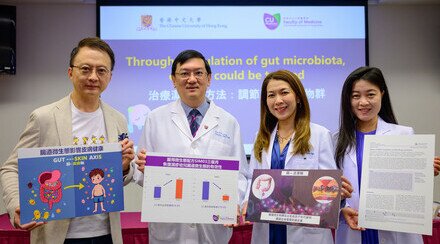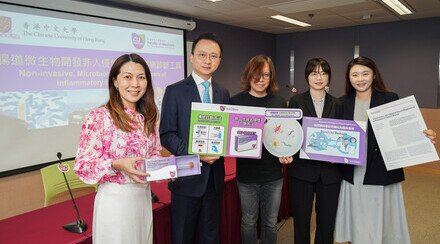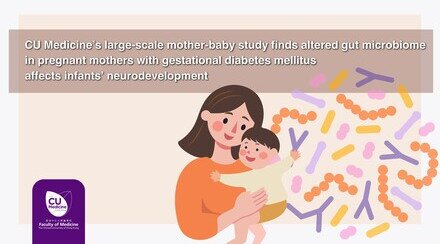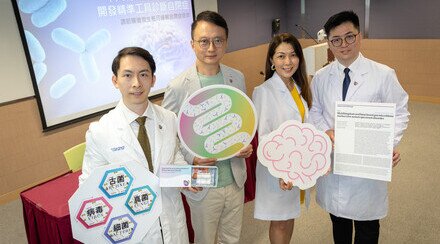CUHK conducts interdisciplinary study on gut microbiota in pregnancy to reduce risk of inflammatory bowel disease in babies
Early childhood is a golden age to manipulate gut microbiota for disease prevention. Researchers from The Chinese University of Hong Kong (CUHK)’s Faculty of Medicine (CU Medicine) are conducting a clinical study to determine how babies’ early-life environment and diet influence gut microbiota and contribute to the development of inflammatory bowel disease (IBD). This study will assess how early-life exposure, from pregnancy to infancy, can influence the child’s long-term health, and how to harness these factors for disease risk prediction, prevention and treatment. Pregnant women with IBD joining the study will receive special care from an interdisciplinary team during pregnancy, as will their infants when they are born.
CU Medicine has been a pioneer in gut microbiota and IBD research
Gut microbiota is an important factor in IBD development, including Crohn’s disease and ulcerative colitis. Changes in the composition of the intestinal bacterial community and reduced microbial richness and diversity (i.e., gut dysbiosis) have been observed in pregnant women with IBD.
CU Medicine faculty, consisting of gastroenterologists, obstetricians, paediatricians, microbiologists and scientists, has been a pioneer in gut microbiota and IBD research. The team is conducting a prospective longitudinal study, the MoMmy-CD (Mother-to-Infant Transfer of Bacteriome, Virome, Fungome and Metabolome in Health and Crohn’s disease) study, to assess how early-life exposure can influence the child’s lifelong health and be harnessed for predicting, preventing and treating disease.

Prof Siew Ng encourages more pregnant women with IBD to join the MoMmy study. Their participation will help the research team discover potentially modifiable maternal and postnatal factors to reduce babies’ risk of developing diseases.
Professor Siew Ng, Professor of CU Medicine’s Department of Medicine and Therapeutics and Director of the Microbiota I-Center (MagIC), said, “New evidence suggests that the gastrointestinal tracts of newborns become colonised with bacteria while in the mother’s womb. The source of these microbes is of immense interest because this initial colonisation is believed to play a crucial role in priming the immune systems of infants and influencing their risk of development of immune-mediated diseases, such as IBD, later in life.”
Pregnant women with Crohn’s microbial composition influences babies’ development in early life
Crohn’s disease is a life-long disabling condition of the gut that generally starts in childhood or early adulthood. The incidence of Crohn’s disease has risen in various areas of the world, particularly in children living in developed nations, and adults and children in newly industrialised countries. The exact causes of Crohn’s disease are unknown but increasing evidence suggests that maternal health, perinatal environmental exposure and microbial colonisation during early life exert marked effects on immune and metabolic programming in the baby, with long-term health-related consequences, including a predisposition to Crohn’s and other immune-mediated diseases.
The MoMmy-CD study is recruiting pregnant women with IBD, their husbands and offspring. The research team will follow up the babies for up to 18 months. It will collect clinical information and serial samples including parental stool, saliva, placenta, cord blood, meconium, infant stool, and breast milk. This study aims to,
- provide interdisciplinary care for pregnant women with IBD and their infants,
- help pregnant women with IBD and their infants restore healthy gut microbiota,
- identify factors associated with the risk of IBD in infants and develop novel treatments.
The preliminary data showed mothers with IBD had lower gut bacteria diversity compared with healthy mothers.The research team has also identified microorganisms transmitted from mothers to offspring during pregnancy. For example, infants born to mothers with IBD showed a higher transmission rate of opportunistic bacterial and fungal pathogens from their mothers, which may put the infants at risk of intestinal inflammation and future risk of IBD. The team is developing novel interventions to manipulate the gut microbiome and reduce the future risk of disease in infants.

Dr Tam Wing-hung says that early childhood is a golden age to manipulate gut microbiota for disease prevention.
Dr Tam Wing-hung, Clinical Professor (Honorary) of the Department of Obstetrics and Gynaecology at CU Medicine, explained, “The first 1,000-day is an important concept for infants’ future development. Increasing evidence suggests that the impact of gut microbiota in early life on health is as important, as the human genome – maternal health and environmental factors such as diet and food additives affect the gut microbiota of infants. Building beneficial gut microbiota during early childhood will positively influence health of future generations.”
The MoMmy-CD study is recruiting subjects with the goal of translating the microbiome into medicine for disease prevention in infants
Professor Siew Ng added, “Our goal is to translate the microbiome into medicine and thereby reduce the health burden of debilitating diseases. We are applying state-of-the-art technologies to improve care for mothers during pregnancy and better monitor the health of foetuses. With increasing evidence supporting the far-reaching health impacts of the human microbiota on the health of babies, we encourage more pregnant women with IBD to join our study. Their participation will help us discover potentially modifiable maternal and postnatal factors to reduce babies’ risk of developing diseases.”
The MoMmy-CD study is supported by The Leona M. and B. Helmsley Charitable Trust.
For details of the MoMmy-CD study, please call 6154 2979, or click here or scan this QR code 

Ms Wong (centre), a mother of 4 children, is a patient of IBD. She hopes to provide more research data by joining the MoMmy study, and help other IBD patients.














































